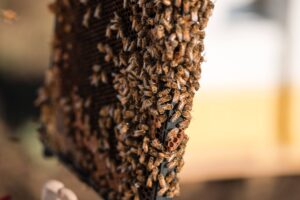Did you know that bees also have gut microbiota?
Similar to humans, bees’ gut microbiota plays a crucial role in their overall health and well-being. We’ve put together some information below about the composition of the gut microbiota of bees, how it functions, the positive impact of healthy gut microbiota on the colony, and the challenges associated with promoting and maintaining proper gut health in bees. We also explore the measures that need to be taken to ensure that bee colonies remain healthy and thrive for the benefit of the broader ecosystem.
What is the gut microbiota of bees?
Within their gut, honeybees contain a wide variety of microorganisms, such as bacteria and fungi. These microorganisms are influenced by a range of factors, like diet, the bee’s environment, and interactions within the hive. For the scientific amongst us, the main bacteria found in the gut of honeybees are the genera Lactobacillus, Bifidobacterium, and Gilliamella.
What is the function of gut microbiota?
Bees rely on the gut microbiota to break down complex polysaccharides found in pollen and nectar, extracting the essential nutrients from their diet. Gut microbiota also aids in immune regulation. The gut bacteria contributes to honeybee immunity and protects them from pathogens and parasites. Some gut microbiota also play a role in detoxifying harmful compounds that can sometimes be present in nectar or from pesticides that bees may encounter.

How healthy gut microbiota can affect the colony.
If the gut microbiota of honeybees is disrupted, it can have a drastic effect on the colony’s overall health. Most notably, if gut health is degraded, it can impair individual bees’ ability to absorb nutrients and metabolise food. On the other hand, a healthy gut microbiota can assist in the overall hormonal regulation of the colony, and in times of stress like temperature changes or exposure to pesticides a healthy gut microbiota can increase the colony’s resilience.
What can we do to help bees’ gut health?
By reducing the use of pesticides in the environment, we can improve bee gut health. Neonicotinoid pesticides are harmful to honeybees since they disrupt gut microbiota and immune systems. Conservation of bees’ natural habitat and ensuring the availability of natural pollen and nectar is another way we can protect the gut health of bees. Supplemental feeding and probiotics are also excellent ways for bees to maintain their gut health. We stock a range of supplemental bee feeds to ensure hive strength, our Bee complete banana supplement is formulated to ensure colony strength over the tough winter period. We also stock Strong Microbials SuperDFM which is a probiotic that functions to create antibiotic-free bees.
Why it’s important to look after our bees
We all know that bees play a massive role in helping our ecosystems to thrive, by pollinating many different species of flora, allowing them to continue to grow which in turn benefits our environment by boosting soil fertility, oxygen production and supporting many other insects that become part of the food chain.
Ensuring that our own bees stay healthy not only helps us to continue beekeeping on both a hobbyists and commercial level, but also encourages growth in bee numbers across Australia that all help to support our delicate ecosystems.
